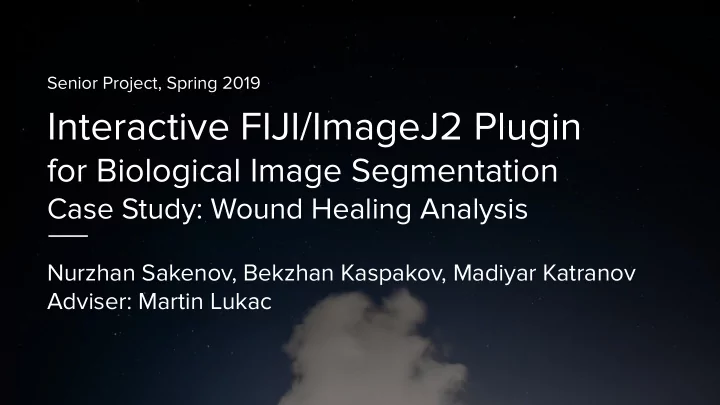

Senior Project, Spring 2019 Interactive FIJI/ImageJ2 Plugin for Biological Image Segmentation Case Study: Wound Healing Analysis Nurzhan Sakenov, Bekzhan Kaspakov, Madiyar Katranov Adviser: Martin Lukac
Wound Healing Analysis Cell migration analysis for drug ● research, cancerous cell analysis, etc . ● A layer of grown cells is cut, and a cell imaging system is used to produce a series of images of the healing “wound”. ● To capture subtle properties of the process, large amounts of images must be taken for analysis, but segmenting them by hand is infeasible. A chunk of a dataset, processed-for-display (cell monolayer, empty space)
What is being developed Plugin for FIJI/ImageJ2: Image Segmentation Module ● Image Interactive Pipeline Selection Framework ● Segmentation Graph UI - build your own pipeline ○ Pipeline performance and accuracy ○ testing Quantification Module (minor milestone) ● Analysis of wound healing velocity ○ Statistical representation of the ○ resulting time series
Work Done in Fall 2019 ● Image processing module with all core functionality ● Functional and user-friendly UI that allows for different dataset loading schemes Interim state Current algorithm Initial image algorithm result result
Graph-based Pipeline Selection UI/UX ● Easy-to-use tool that tremendously extends the possibilities of the plugin The branching nature of graph-like ● pipelining will allow for visual construction of various processing pipelines ● Will allow for comparison of different combinations of operations based on metrics like computational costs or accuracy
To-Do This Semester Interactive Graph-based pipeline ● selection ● Visual graph editor via Swing and JGraphX Nodes are tunable operations, ● edges are data flow ● Each path of the directed acyclic graph will represent a single algorithmic pipeline
Each node is an operation with customizable parameters
Desired Workflow Step 1: Construct the graph, specify the parameters, click “RUN” The graph will be validated and its information will be transferred to the plugin
Step 2: The image processing module parses the graph and performs the processing accordingly.
Step 3: If needed, performance evaluation (Hamming Distance of binary masks) could be done with a ground-truth dataset
Thank you!
Recommend
More recommend